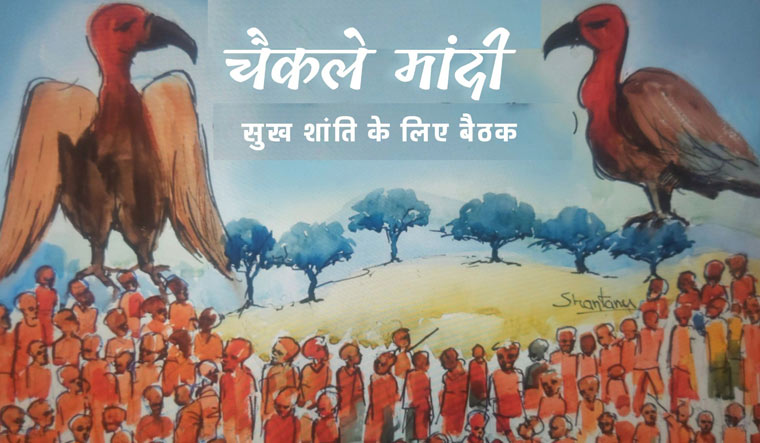A two-month-long initiative, ‘Peace Yatra’, that aims to strengthen the push of citizens for a dialogue between government and Maoists to end violence and killing in conflict areas in Chhattisgarh, Maharashtra and Odisha, began on Saturday in Bhilai of Chhattisgarh.
The first ‘Chaikle Maandi’ (peace meeting) of a series of such meetings, planned for the next two months, was held with 50 tribal people – most of them employees or retired employees of the Bhilai Steel Plant (BSP)—attending.
The yatra (tour) has been launched under the banner of New Peace Process (NPP) – an initiative of tribal and supporting groups seeking a peaceful resolution to the Maoist issue.
Convener of the NPP, Shubhranshu Choudhary said the yatra will cover 10 districts in what is known as ‘Dandakaranya region’ including seven in Bastar division and the Mohla-Manpur Ambagarh Chowki district of Chhattisgarh, Gadchiroli in Maharashtra and Malkangiri in Odisha. Attempts will be made to hold one 'Chaikle Maandi' per day during the two months, he said.
Fifteen persons associated with the NPP will be carrying out the initiative, holding the 'Chaikle Maandis' with different groups of tribal people in the conflict areas of these 10 districts. “The aim is that there should be citizens’ voice created that can pressurise the political parties, especially the Congress, which is the ruling party in Chhattisgarh to take steps forward for peace dialogue with the Maoists, ahead of the assembly polls that will be held in October-November 2023,” Choudhary told THE WEEK.
He said the time is ripe for such steps by the government as the Maoists have shown an inclination for peace dialogue during the past two years by seemingly adopting the ‘united front’ strategy that saw secular democracy established in once-Maoist conflict-hit Nepal.
The united front strategy involved alliances with like-minded ‘over-ground’ groups that talk about the rights of the local people, which in the case of central India conflict area, is the rights of ‘jal, jungle and zameen’ (water, forest and land) of the tribal people.
Choudhary said the Maoists in Dandakaranya have managed to form a people’s front that uses the way of peaceful agitation to demand rights, starting with the Silger agitation of Sukma district where four locals were killed in CRPF firing in May 2021. The Maoists are also pushing their ‘united front’ strategy by incorporating their own people in other established organisations that take up peaceful initiatives like informal dialogue with the government on various rights-based issues, he added.
Choudhary, who has covered Maoist conflict as a BBC correspondent for a long time, said he sees similarities in the strategy adopted by the Maoists in Nepal whom he interacted with as part of his work. “Now since the Maoists are adopting the united front strategy here; it is a good time for the government also to take steps forward. The Congress promised serious efforts for peace talks with Maoists in its 2018 poll manifesto. Now, another election is approaching and we feel that pressure from citizens can probably push them to take the required step. Our initiative is trying to ensure this,” Choudhary said.



